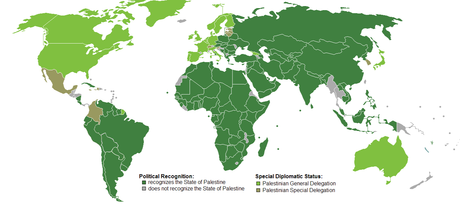This month as Palestine goes to the UN to seek full statehood, many are hopeful that Palestine will be successful. Unfortunately, however, there are problems with the very structure of the UN that may very well prevent a Palestinian state from being recognized, namely the UN Security Council members’ veto power.
One of the main goals of the UN is to “develop friendly relations among nations based on respect for the principle of equal rights and self-determination of peoples, and to take other appropriate measures to strengthen universal peace.” This respect for the “self-determination of peoples” extends to everyone, yet, ironically enough, due to the veto power of UN Security Council members the goal of respecting the self-determination of people is in peril. This is especially true in the case of the Palestinians.
The UN is structured in such a manner where each Council member has one vote, yet “Decisions on substantive matters require nine votes, including the concurring votes of all five permanent members.” [2] Seeing as how one of the purposes of the UN Security Council is to admit new members [3], the admission of Palestine as a state would constitute a “substantive matter” and thus would be subject to the veto measure.
The United States has already stated that if Palestine goes through with the UN statehood bid instead of going back to “negotiations” between the US and Israel, they will veto the Palestinian statehood bid. This would only serve to continue the Israel-Palestine conflict, to the detriment of both Israelis and Palestinians. It would go against the purpose of the UN Security Council, which is “the maintenance of international peace and security.” [4]
Yet, there are also problems with the Palestinian leadership as Palestine has had observer status since 1974 and been allowed to partake in security council debates since 1976. Thus, the Palestinian leadership could have already raised the issue of statehood for quite some time. The fact that they have not speaks in and of itself about how much they truly care about attaining a Palestinian state. Also, a Palestinian state may not even do anything to help Palestine as one must
Consider the experiences of Lebanon and Syria. The former had its southern strip occupied by Israel for 22 years, from 1978 to 2000; the latter lost the Golan Heights to the Jewish state in 1967. Did "statehood" protect Lebanon from Israeli assault? Has membership of the UN general assembly helped Syria regain the Golan Heights? [5]
Yet, even if the Palestinians use the UN as a platform to expound upon the illegal actions of Israel and do their best to get the UN to pass resolutions calling for Israel to end its oppression of Palestinians, it might not work due to the US vetoing any of the resolutions and the fact that Israel has ignored UN resolutions before. [6]
However, there may be hope in BRICS. According to the map below, all BRICS nations have recognized the state of Palestine.
Map of political recognition of Palestine
They are currently opposing the Western interference in the Syrian protests due to the West’s recent oil embargo on Syria. [7] Thus, if the Palestinians can convince BRICS, especially Russia, who favors dialogue, to support the Palestinian cause, a true Palestinian state might have a chance to exist.Endnotes
1: http://www.un.org/en/documents/charter/chapter1.shtml
2: http://www.un.org/sc/members.asp
3: http://www.un.org/Docs/sc/unsc_functions.html
4: http://www.un.org/Docs/sc/unsc_background.html
5: http://www.commondreams.org/view/2011/09/02-4
6: http://ipsnews.net/news.asp?idnews=45357
7: http://rt.com/news/brics-syria-west-hegemony/


